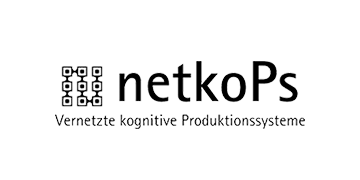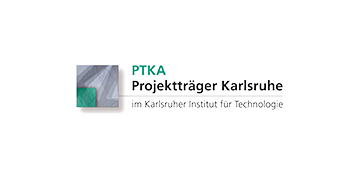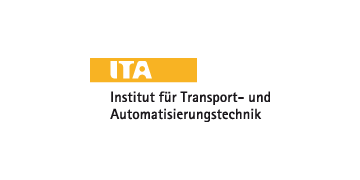| Theme | Industry 4.0, Automation |
|---|---|
| Project title | Networked cognitive production systems (netkoPs) |
| Project duration | 01.11.2013 – 31.12.2016 |
| Download | |
| Press release |
During this joint research project, technologies for the realization and economical operation of connected, cognitive production systems were developed. This should make it possible in the future that machinery, handling and transport systems act smart and show cognitive abilities similar to humans. In the future, elements of a production system should communicate, identify problems, make their own conclusions, learn and plan. Through the interaction of an integrated network with a decentralized control continuous conveyor, the development will be easier extensible and self-optimizing material flow systems will be sought. In addition, an innovative cognitive conveyor was developed which not only enables the transport of components within an integrated production system, but also assumes other functions, such as sorting, ejecting, orientating, buffering and separating.
- Sorry, no events available.
Vergangene Termine gefunden
- 11.11.2013
- IPH – Institut für Integrierte Produktion Hannover gGmbH, Hannover
- 13.12.2013
- Continental Automotive GmbH, Regensburg
- 26.02.2014
- Continental Automotive GmbH, Karben
- 20.03.2014
- Continental Automotive GmbH, Karben
- 29.04.2014
- Lenze SE, Aerzen
- 19.05.2014 - 23.05.2014
- Messegelände, Hannover
- 08.07.2014 - 09.07.2014
- Fraunhofer Institut FhG-IAO, Stuttgart
- 03.12.2014
- Schloss Herrenhausen, Hannover
- 16.01.2015
- Lenze SE, Hameln
- 13.04.2015 - 17.04.2015
- Messegelände, Hannover
- 22.04.2015 - 23.04.2015
- Heinz Nixdorf MuseumsForum, Paderborn
- 29.04.2015
- IPH – Institut für Integrierte Produktion Hannover gGmbH, Hannover
- 20.07.2015
- IPH – Institut für Integrierte Produktion Hannover gGmbH, Hannover
- 09.09.2015
- Continental Automotive GmbH, Karben
- 04.04.2016
- IPH – Institut für Integrierte Produktion Hannover gGmbH, Hannover
- 05.07.2016 - 06.07.2016
- Karlsruhe/Ettlingen
- Programm-Download (pdf)
- 29.05.2017, 09:30 h - 15:00 h
- Seminarraum 2, Produktionstechnisches Zentrum Hannover, An der Universität 2, 30823 Garbsen
- Programm und Anfahrtsbeschreibung
Publications about the project
One aim of the research project "Networked cognitive production Systems (netkoPs)" was the development of the formal language Production Modeling Language (PML). The PML is to be understood as a digital twin of the product and the production system. At the beginning, useful potentials for PML from the current state of research as well as the aims of the research project netkoPs were derived. Afterwards, based on a requirement analysis, the required data fields for the PML were classified. In a next step, the PML, based on the AutomationML, was implemented. The potential benefits formulated in the context of netkoPs could finally be demonstrated in connection with the further research results. For example, a preliminary ProductPML can equipping the machine before the product arrives.
digital twin, ProductionML, decentralized control, material flow
The lecture presents small-scale, multi-directional conveyor modules that implement the material flow of goods using a distributed, decentralized control. They are connected to form a transport matrix. In addition to the decentralized control the used hardware is described.
decentralized control, route planning, transport matrix
Within this article a decentrally controlled, intelligent material flow system is presented. The novel product routing is based on a decentralized intelligence and conducts the route planning of the individual materials. The decentralized intelligence permits an expansion or adaption of the production line at any time without significant configuration. In addition, the networked decentralized intelligence allows a parallel flow of material and information, and an identification of the layout of the entire conveyor system. Another core element is the decision-making cognitive conveyor, which is composed of small-scale conveyor modules. In addition to transporting, injecting and ejecting a variety of intralogistics functions can be solved with the cooperation of these conveyor modules. For this cognitive conveyor a drive solution is presented that meets the requirements in terms of functionality and compactness.
Decentralized Intelligence, Material Flow, Cognitive Conveyor, ProductionML, Routing
In this article a small scale, cyber-physical conveyor system using the example of a cognitive conveyor is presented. This cognitive conveyor is modularly assembled of individual conveyor modules that are smaller than the transported units. Furthermore the cognitive conveyor is in the position to handle different intralogistical functions such as transport unit's transporting, rotating, buffering and sequencing. Parallel to the route of the physical transport unit, a data shadow is moved: Hereby all data describing the transport operation are available at any time of transport. Cognitive conveyor's control is decentralized and distributed. Hereinafter both the hardware setup of the conveyor modules and the necessary control algorithms are described. The control algorithms are on the one hand used to move the physical transport unit on the surface of the cognitive conveyor. On the other hand it is utilized to align the data shadow with physical transport unit's information.
cyber-physical conveyor technology, decentralized control, material flow, ProductionML
In the presented article, the initial situation, which leads to the development of a small-scaled cyber physical material handling system, is presented first. Therefore, apart from the general requirements of material handling systems, the reasons for a determination of new requirements are presented as well. Since the developed system consists of multiple decentralized controlled conveyor elements, the data transmission principle inside the system will be described.
cyber physical material handling system, data transmission, decentralized controlled, conveyor
In the context of industry 4.0 cognitive technical systems are systems that can adapt functionality flexibly and completely personalized to the specific needs of an operator or a product. Due to a wide range of intelligent sensors technical systems have the cognitive ability. In this presentation, examples of cognitive system from the intralogistics are shown.
intralogistics, cognitive system, sensor technology, industry 4.0
The customer-oriented individual production, as part of the future project "Industry 4.0", is based on the progressive shortening of development cycles. The parallel to the material flow directed flow of information gains in importance for a decentralized material flow control. The use of this newly available information through the production systems requires cognitive abilities on the machines. For this future machines as well as handling and transport systems should communicate, identify problems, make their own conclusions, learn and plan. For this purpose cyber physical production systems are the technological foundation.
cyber-physical production systems, individual production, intelligent networking
Planning ahead, make decisions and adapt flexibly to new situations: What is natural for people should now learn machines. That is the aim of the industrial 4.0 project netkoPs, which developed together by ITA and IPH.
cyber-physical production systems, individual production, intelligent networking
The main idea to develop an individual production is trend-setting and a part of the future project "Industry 4.0". Apart from the optimization of the manufacturing and delivery time there will be a focus on elevated information. Therefore the production systems of the future have to live up to requirements like the mutability, the real-time and network capability. A specific trial is based on the idea to port the cognitive features of a human to the production systems.
cognition,production systems, flow of information, human-machine interaction












